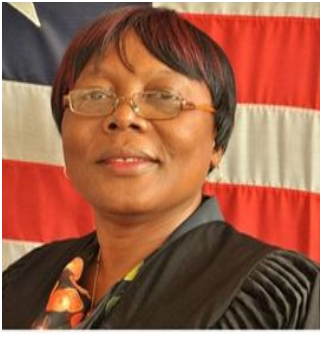By Bill W. Cooper
The 30 percent gender quota especially in major leadership roles seems to be making sense in the Boakai-led government as the Supreme Court sets to receive Ceaineh D. Clinton-Johnson to complete the Youh-bench as the next Associate Justice.
Cllr. Clinton-Johnson’s confirmation received a unanimous vote yesterday bringing to total the number of three women already on the Supreme Court bench thus marking a significant step towards gender equality and representation.
Currently, the Supreme Court benchis comprised of two females and two males namely Chief Justice Sie-A-Nyene Yuoh, Associate Justice Jamesetta H. Wolokolie, Associate Justice Yussif D. Kaba, and Associate Justice Yamie Quiqui Gbeisay, Sr.
However, the confirmation of Associate Justice Clinton-Johnson comes after a rigorous vetting process by the Senate Committee on Judiciary, Human Rights, Claims and Petitions, where her qualifications and experience were thoroughly examined.
With a background in law and a proven track record of upholding justice and fairness especially as the presiding judge in Criminal Court ‘E’, Clinton-Johnson was however deemed fit to serve on the Supreme Court bench, as contained in the Committee report submitted to full plenary.
It can be recalled that President Joseph Boakai on June 21, 2024, took a significant step towards closing the gender gap and halting male dominance at the Supreme Court, after nominating Judge Ceaineh Clinton-Johnson as Associate Justice of the Supreme Court of Liberia.
In the announcement placed on the Executive Mansion website, President Boakai called on Cllr. Clinton-Johnson to continue demonstrating diligence, commitment, integrity, professionalism, and loyalty in her service to the country.
Her nomination follows the vacancy created by the death of former Associate Justice Joseph Nagbe; though he had requested an early retirement before his demise out of country where he was taken to seek advanced medical treatment following a protracted illness.
But since her appointment, there had been protested against by some rights groups in support of the establishment of War and Economic Crimes Court (ECC) in which they argued that her appointment would somehow undermine the establishing of the Court.
Prior to her nomination and subsequent confirmation, Clinton-Johnson served as Resident Circuit Judge of Criminal Court ‘E’, 1st Judicial Circuit Court, during the May Term of Court as well as in various legal capacities.
During the February Term of Court, she was assigned as Judge of the 13th Judicial Circuit Court in Margibi County and between 2006 and 2007, she served as Deputy Minister of Public Safety at the Ministry of Justice before being appointed as a judge.
Despite her accomplishments, Judge Clinton-Johnson has had a contentious relationship with the media as Journalists covering the Temple of Justice have often clashed with her due to her “belligerent” attitude, frequently ordering reporters out of her courtroom during major cases.
Also, in July 2022, the New Republic reported that Judge Clinton-Johnson was accused of juror tampering in a case she presided over as well as alleging that she disbanded jurors without allowing them to confirm their verdict in open court, a practice contrary to standard legal procedures.
This action further led to a motion for a new trial by the defense counsel but despite these controversies, Judge Clinton-Johnson is known for her toughness and firm stance on major court decisions.
In August 2018, she issued a writ of summons against then Margibi County District One Representative Tibelrosa Tarponweh for contempt of court, highlighting her no-nonsense approach.
While serving at the Rape Court, Judge Clinton-Johnson also gained attention for dismissing several rape cases due to lack of evidence, criticizing the prosecution for presenting weak cases before her.
Meanwhile, the confirmation of Judge Clinton-Johnson now marks a significant shift in the traditionally male-dominated judiciary system of Liberia, where women have often been underrepresented in positions of power and authority.
Also, the confirmation of Associate Justice Clinton-Johnson comes at a time when Liberia is facing numerous challenges, including issues of corruption, human rights violations, and political instability.
The presence of three women on the Supreme Court bench is now seen as a beacon of hope and progress for the country, signaling a new era of inclusivity and diversity in the judiciary system of the country.

